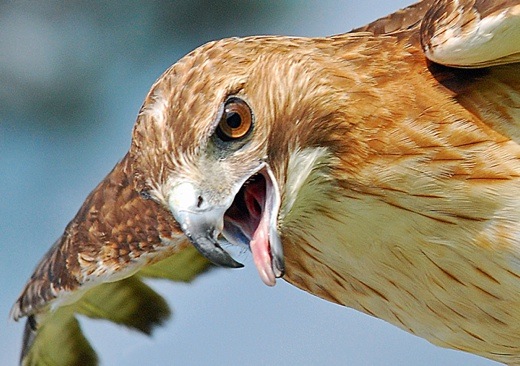 Image above: Wildlife photograph of hawk by Warren Price. From (http://www.warrenpricephotography.com/2008/11/19/wildlife-photography-a-captive-audience).
Image above: Wildlife photograph of hawk by Warren Price. From (http://www.warrenpricephotography.com/2008/11/19/wildlife-photography-a-captive-audience).
By Brian Merchant on 26 October 2010 for TreeHugger.org - (http://www.treehugger.com/files/2010/10/environmentalism-rise-climate-hawks.php)
Last week, the climate writer Dave Roberts called for his readers and colleagues to leave suggestions for a new term to describe anyone who doesn't consider themselves a full-blown environmentalist, but is nonetheless concerned with climate and clean energy issues. People who may not follow wildlife conservation, but who are keen on tackling climate change. Renowned climate blogger Joe Romm, for instance, has long said that he's not an environmentalist -- he's just someone who's worried about the vast threats posed by runaway climate change. And so, after long debate and pondering, Roberts settled on a term: 'Climate Hawks'.
First, Roberts explains the reasoning behind pursuing this semantic quest in the first place:
The point is not, emphatically not, to "rebrand environmentalism." Please kill me if I ever have to listen to another discussion about rebranding environmentalism. The point is not that environmentalists need something new to call themselves, but that the class of climate hawks is not coextensive with the class of environmentalists. They are not the same group. In a Venn diagram, there would be substantial overlap but also substantial ... underlap? nonlap? disjoint? Point is, there are plenty of people who understand climate change and support clean energy but do not share the rest of the ideological and sociocultural commitments that define environmentalism as historically understood in the U.S. (Which is fine!)And so, he rules out anything too crunchy, or too exclusive or inclusive, or anything too vague. He settles on climate hawk. His reasoning:Anyway, the main goal of the exercise was description, not marketing or "framing" or whatever. This set of people already exists. I just need something to call them!
First and foremost, it doesn't carry any implications about The Truth. It doesn't say, "I'm right, you're wrong. I'm smarter and more enlightened than you." Instead it evokes a judgment: that the risks of climate change are sufficient to warrant a robust response. By definition, everyone must make such judgments on their own. Rather than being a Manichean choice -- you get it or you're stupid -- it becomes about values, about how hard to fight and how much to sacrifice to defend America and her future. That's the right conversation to be having.Are you sold? Would you consider yourself a climate hawk? I'm not sure I would, if only because of my commitment issues. The whole thing makes for a fun exercise, to be sure, and it certainly gives the deflated community of climate watchers something to rally around.Yes, I'm well aware that "hawk" has militaristic overtones. Trust me, when it comes to matters military I'm a DFH of the old school. But lefties shouldn't be precious. The health of Mother Earth just doesn't move that many people. For better or worse, more Americans respond to evocations of toughness in the face of a threat.
In foreign policy a hawk is someone who, as Donald Rumsfeld used to put it, "leans forward," someone who's not afraid to flex America's considerable muscle, someone who takes a proactive attitude toward gathering dangers. Whatever you think about foreign policy, is that not the appropriate attitude to take toward the climate threat? Does it not evoke a visceral sense of both peril and resolve, the crucial missing elements in America's climate response?
Some Definite Climate Hawks: US Navy Vice Admiral: Climate Change is a Threat Multiplier (Video) 33 US Military Generals, Admirals: " Climate Change is Threatening Our National Security" 73% of Iraq and Afghanistan War Vets Support Climate Bill
No comments :
Post a Comment